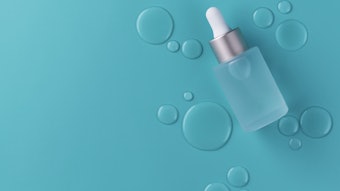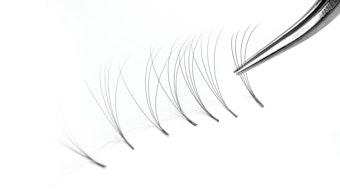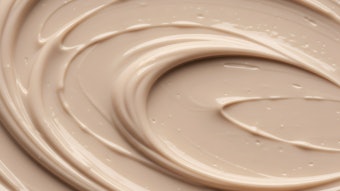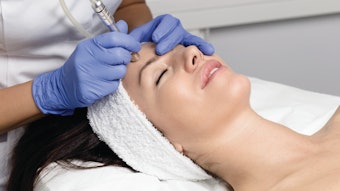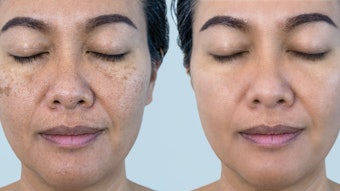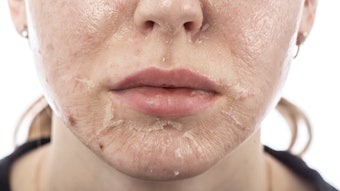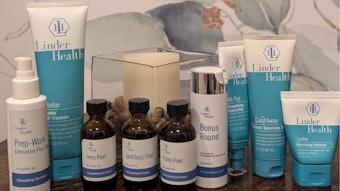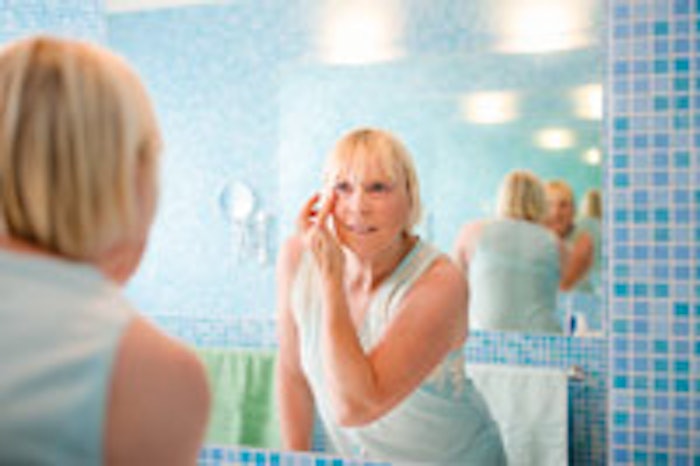
Menopause is a natural condition that all women go through as they age. The exact age the process begins varies from person to person; however, it will happen at one point or another, and marks the end of a woman’s reproductive period. During this time, there are many hormonal changes that take place, and these can result in multiple changes throughout the body.
Clients may find that they experience mood swings, deal with migraines and have hot flashes, along with many other symptoms. Another primary change is that skin can be altered dramatically in the years just before menopause. This is because the amount of estrogen and progesterone in the female body begins to decrease during this time.
It’s important that you are aware of these changes so that you can help your clients prepare for what’s to come. By advising them to make certain preparations now, you can minimize the affect menopause has on their skin when it does finally strike. This preparation will allow clients to have more self-confidence, and ensure that they look and feel their very best on a daily basis, despite what may be going on with their hormones.
Dry skin
The decrease in estrogen during menopause often results in a reduction in oil production. Although this can prevent some breakouts, it has a drying effect on clients’ skin. The dehydration means that the skin isn’t as supple and is unable to hold on to the necessary level of moisture. As it dries, clients may notice a change in texture, and it may also begin to flake and peel, leaving a less-than-desirable appearance.
Skin in this condition needs smart fats, which include essential fatty acids, gamma linolenic acid (GLAs), omega-3 fatty acids, and even algae oil and squalane. These are capable of replenishing the hydrolipid barrier. Products that are designed to nourish and protect skin should be used during this time. Seek out products that contain squalane, as well as cleansers and moisturizers that use argan oil, olive oil, grape seed oil, hyaluronic acid and sea buckthorn oil.
Advise clients to avoid saunas, as well as hot showers and baths, because these can strip skin of oxygen and cause the skin’s barrier to dry out even further. Clients may want to set the thermostat in their homes to be a little cooler so the skin has the opportunity to soak up as much hydration as possible.
If they aren’t already, clients need to begin applying moisturizer to the skin as part of their daily regimen. This should be applied first thing in the morning before makeup and also before bed every night after washing the face. Some of the best ingredients to look for in a moisturizer include dimethicone to help with uneven texture, hyaluronic acid to replace what the body has lost naturally, glycerin and ceramides. By helping clients review the ingredients of their moisturizer, you can make sure that they are giving skin what it needs most. Review the many professional skin care choices and choose to carry a line in your retail area that you believe in and stand behind, and recommend this to menopausal clients.
Itchy skin
Clients may also complain that their skin is considerably more itchy during menopause. Various sensations throughout the skin may occur that they have never experienced before, including numbness, tingling and even a crawling feeling. Clients should avoid long periods of time in the sun. If they are at the beach, recommend that they sit at the shoreline where they can experience natural exfoliation using the wet sand. This will not only help to alleviate the itchy symptoms, but it will also remove dead skin cells and promote new skin growth at the same time.
Dry skin during menopause may not just occur on the face; it also may show up along the arms, legs and even on the scalp. The dead skin cells that are causing the itchiness need to be removed. Recommend a home-care product that will provide clients with body exfoliation, and retail it in your spa. Consider retailing salt and sugar scrubs that contain vitamins A and E to help protect and nourish skin at a higher level.
Acne and breakouts
The reduction of estrogen will take a toll on clients’ bodies by allowing more testosterone to come through. This can result in the production of a thick sebum that can block clients’ pores. When this happens, microcysts may form around the mouth, chin and jawline. There are few pustules and papules, but lesions may be deeper. This means that they will be more difficult to treat.
Ingredients that help resurface the skin include vitamin A, and salicylic and glycolic acid, which can be used to help cleanse the skin more effectively. They can decrease oil production, remove built-up dead skin cells and even reduce inflammation. Ginger and green tea are two natural ingredients that can help with these tasks, as well. Benzoyl peroxide may also be used in an effective topical treatment without drying the skin.
Make sure you clients don’t pop or manipulate anything that shows up on their faces. This may result in spreading the bacteria within the pustules.
Sun-damaged skin
Sun damage may be more pronounced during menopause. The maintenance of melanocytes is controlled by estrogen and, when these levels decrease, melanocytes become more visible. This means that areas that have been exposed to the sun for years and years are now going to show to the fullest extent.
Help clients nourish the skin before menopause starts. This can be done by addressing lines, wrinkles, uneven texture and pigmentation through the application of chemical peels and various forms of exfoliation. Any time that you can nourish and protect the skin, it will be to the clients’ benefit. Some ingredients that should be used include malic, glycolic and lactic acid, vitamins C and B-5, licorice extract and ferulic acid.
Loss of elasticity
Menopausal clients are also going to notice that their skin is not as elastic. This means that they will experience more sagging or dropping skin, and the formation of more wrinkles. This is due to a redistribution of fat and the loss of fat that supports various areas of the face, as well as the neck, arms and even hands. Collagen will not be produced as quickly as in the past, which also affects the overall elasticity within the face and other body parts.
By introducing your clients’ skin to ingredients that protect, stimulate, and repair collagen and elastin, you can promote healthier-looking skin for your menopausal clients. Use products that feature ingredients such as vitamin A, marine collagen, growth factors and alpha lipoic acid. Antiglycation is a factor within the aging of skin and cinnamon extract, green tea, wheat amino acids and L-gluthione are ingredients that help with this process.
An ounce of prevention
The reality is that your clients’ bodies are going to be changing a lot throughout the process of menopause. As hormone levels change, they are going to impact clients’ skin in many undesirable ways. Every woman is different, although they will likely find that skin is no longer as supple and elastic as it once was. The drying effects of menopause can result in uneven tones and textures that make it harder to apply makeup. During this time of their lives, clients may not look and feel their best.
Make sure that you take action with clients, even before menopause. Some preventive care can go a long way in helping their skin prepare for menopause. Unwanted facial hair, wrinkling, dry and itchy skin, and other issues are going to plague them if they don’t start thinking about hormonal changes ahead of time.
Help clients keep their skin as healthy as possible. If they are going out into the sun, clients must protect it with sunscreen and by wearing large hats to shield from UV rays. This will ensure that there is less sun-damaged skin to deal with later on.
Additionally, make sure clients exfoliate on a regular basis to remove dead skin cells and promote new skin cell growth. This will lead to smoother and healthier skin, so they won’t experience such a dramatic change when they reach menopause.
There are many great professional products available that can help clients care for their skin. Help them get into the habit of reading labels to find out what ingredients make up their products, so they know they are buying the best possible option for their specific skin concerns. Cleansers, moisturizers and other products should also become part of clients’ daily home-care routines in order for them to care for their skin before and after menopause to avoid experiencing overly dramatic
Cherie Dobbs is the president and CEO of Dermastart, Inc., parent company of the brands ClearChoice and Prana SpaCeuticals. Dobbs has worked with dermatologists and plastic surgeons, as well as various skin care companies learning first-hand what ingredients and formulations are truly effective. She has since become a leader in educating not only fellow estheticians, but also medical professionals and consumers on ingredients and product technologies.
